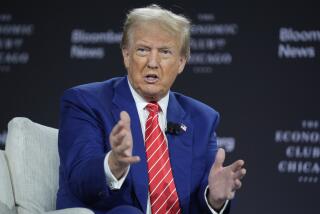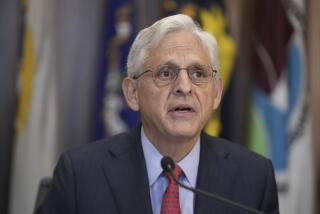Donald Trump, citing Julian Assange, again mocks intelligence officials’ case for Russian hacking

Russian cyberattacks pose “a major threat” to the U.S. government, the military and financial institutions, the intelligence officials said.
Reporting from Washington — Despite Donald Trump’s repeated calls for Americans to “move on” from Russia’s provocative cyberattacks during the 2016 presidential election, it won’t be so easy — partly because the president-elect refuses to move on.
Trump launched another barrage of mockery at U.S. spy agencies Wednesday and aligned himself with Julian Assange, the fugitive founder of WikiLeaks, a secretive group that has published millions of stolen U.S. military, diplomatic and intelligence documents.
The odd alliance emerged as Congress plans its first hearing Thursday on the Russian election hacks and as U.S. intelligence officials scramble to craft a convincing case for the skeptical president-elect and the public that Russian intelligence agencies interfered with the election by stealing and leaking emails to WikiLeaks and other websites.
On Friday, several top intelligence officials, including Director of National Intelligence James R. Clapper, CIA Director John Brennan and FBI Director James B. Comey, are scheduled to meet with Trump in New York City to explain why they’ve concluded that senior officials in the Kremlin, including Russian President Vladimir Putin, authorized the hacking operation.
Sean Spicer, Trump’s spokesman, said Wednesday that Trump questions U.S. officials’ judgments about Russian interference in the campaign, and not the intelligence itself.
“What he wants to hear from them is, how does the raw intelligence justify the conclusion that is being presented?” Spicer said.
The intelligence officials also will brief Trump on the broader review that President Obama recently requested on Russian and Chinese hacks during the 2008, 2012 and 2016 U.S. elections and what was learned from those intrusions, two U.S. officials said.
They said the classified report is nearly done and may be given to Obama on Thursday. The president ordered it completed before he leaves office on Jan. 20 to ensure a full record is available, aides have said.
Senior intelligence officials are grappling with how much of the report to make public without exposing sensitive surveillance systems and intelligence assets. They already have blamed two Russian spy services, the GRU and the FSB, for organizing the theft and release of sensitive emails last summer and fall, but haven’t said exactly how they know.
“There’s no debate in the U.S. administration about the fact — and it is a fact — that Russia interfered in our democratic election,” a senior U.S. official told reporters in a recent briefing on condition of anonymity. “We’ve established that clearly to our satisfaction.”
New details may emerge Thursday when several of the nation’s top spies — including Clapper and Adm. Michael S. Rogers, head of the National Security Agency — testify at a Senate Armed Services Committee hearing on the Russian hacks, the first since the November election.
The committee chairman, Sen. John McCain (R-Ariz.), and many others in Congress are perplexed by Trump’s deriding of the intelligence and by his praise for Putin, who has denied any Russian interference in the U.S. election.
“This was done by the Russians, and I hope by Friday Mr. Trump will come to that realization,” Sen. Lindsey Graham (R-S.C.), a member of the committee, told CNN.
Trump’s open disdain for U.S. intelligence judgments has grown in recent weeks after the CIA and others concluded Russian leaders orchestrated the release of thousands of stolen emails from the Democratic National Committee and Hillary Clinton’s campaign chairman, John Podesta, to tip the election in Trump’s favor.
He has belittled the conclusions, comparing them to the CIA’s inaccurate claims of Saddam Hussein’s stockpiles of chemical and biological weapons before the 2003 invasion of Iraq.
And he questioned the motives of top intelligence officials, complaining Tuesday on Twitter that his briefing “on so-called ‘Russian hacking’ was delayed until Friday, perhaps more time needed to build a case. Very strange!”
U.S. officials say the briefing was always scheduled for the end of the week, and was not delayed, to take advantage of the classified report prepared for Obama.
On Wednesday, Trump tweeted praise for Assange for denying that Russians had provided the stolen emails to WikiLeaks. “Russians did not give him the info!” and “a 14 year old could have hacked Podesta,” Trump wrote, paraphrasing Assange.
Assange made the claim to Fox News host Sean Hannity in an interview that aired Tuesday. Hannity, Trump’s biggest supporter in the media, flew to London to meet Assange in the Ecuadorean Embassy, where he has lived in exile for more than four years.
“Our source is not the Russian government and it is not a state party,” Assange told Hannity. Assange didn’t address whether Russian authorities conducted the original hacking or how he knows Russian authorities were not behind the leaks.
Assange remains in exile in the London embassy because he faces sexual assault allegations in Sweden. U.S. officials have said Assange is under criminal investigation.
The White House challenged Trump for aligning himself with a figure whom many in the U.S. intelligence community consider a threat to national security.
“The president-elect will have to determine who he’s going to believe,” White House spokesman Josh Earnest said Wednesday. “On one hand, you’ve got the Russians and the aforementioned Mr. Assange. On the other side, you’ve got the 17 intelligence agencies of the United States government [and] outside cyber experts that have taken a look at this situation.”
Some Democrats all but accused Trump of supporting an enemy of the United States.
“That he would accept the transparently self-serving denials of the Kremlin is alarming enough, but that would now cite people like Assange who have demonstrated universal hostility to the United States and its interests takes him into new and even more treacherous territory,” Rep. Adam B. Schiff of Burbank, the top Democrat on the House Intelligence Committee, said in a statement.
U.S. intelligence analysts and cybersecurity experts concluded that the Podesta hack was part of a massive “spear-phishing” operation that targeted more than 1,000 American politicians, academics and journalists and contained hallmarks of a Russian hacking ring working at the behest of the government in Moscow.
On Friday, the FBI and the Department of Homeland Security released a report outlining some of the evidence pointing to Russia’s role in the attacks on the Democratic National Committee and on Clinton’s campaign.
At the same time, Obama ordered the expulsion of 35 Russian diplomats suspected of spying and the closing of two Russian-owned waterfront estates, on Long Island in New York and on the Eastern Shore of Maryland, long used by Russian diplomats and believed to be harboring spies, in direct response to the cyberattacks.
On Wednesday, the State Department said that all 35 Russians had left the country by Sunday with their family members.
Many of the children of the expelled officials were invited to the Kremlin’s New Year’s and Christmas parties when they arrived in Moscow on Monday, according to the official Tass news agency.
Twitter: @ByBrianBennett
ALSO
When Trump says he wants to deport criminals, he means something starkly different than Obama
Yes, Trump can boost deportations and gut the Dreamer program for young immigrants
An outsider takes charge of the Border Patrol — and yes, he’ll wear the green uniform
More to Read
Sign up for Essential California
The most important California stories and recommendations in your inbox every morning.
You may occasionally receive promotional content from the Los Angeles Times.











